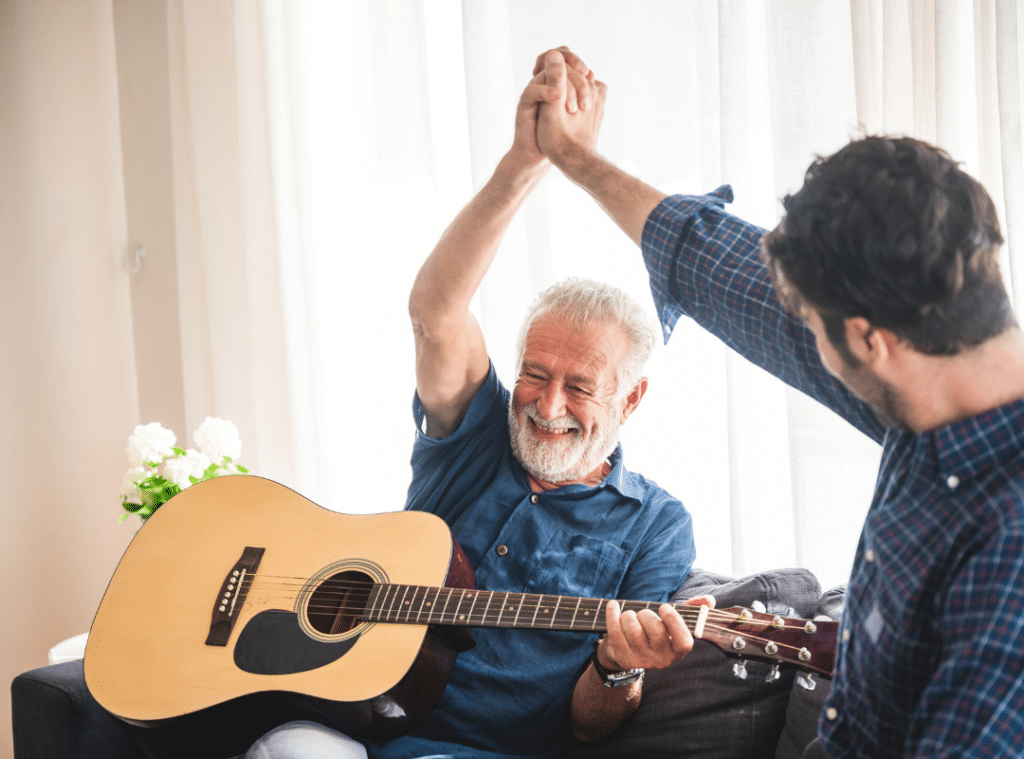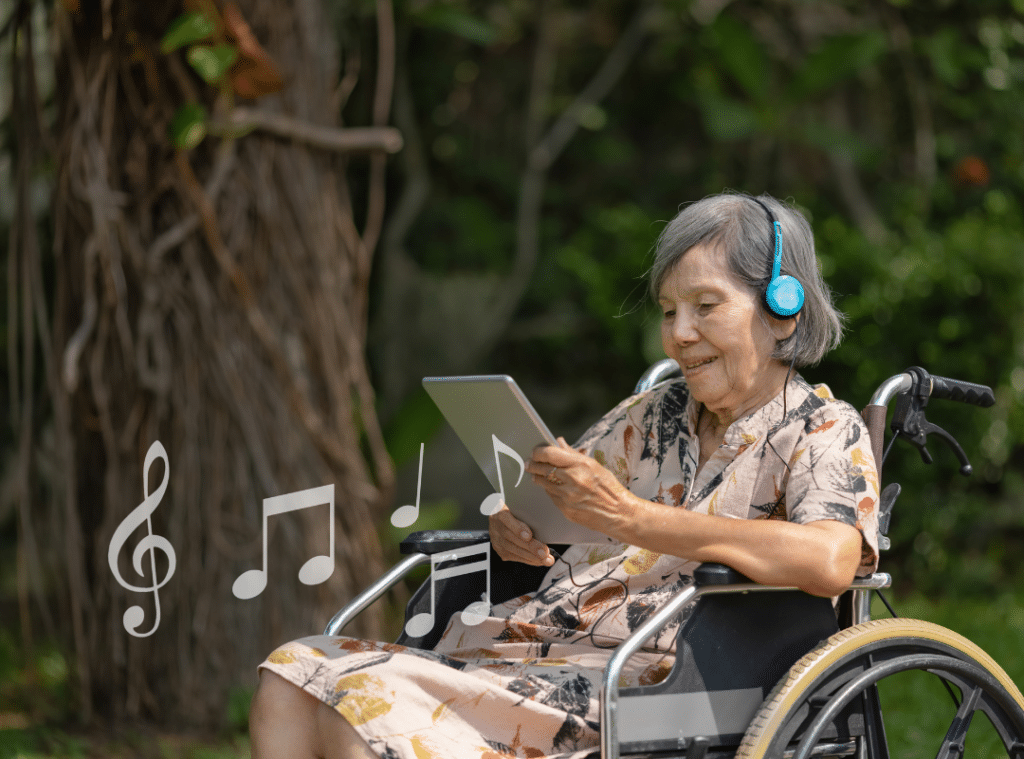Music for Elderly People That Brings Back the Joy
Music for elderly people is more than entertainment—it’s a lifeline to treasured moments and emotional healing. At places like Westmont of Carmel Valley, where care meets community, music has the power to evoke joy, spark conversation, and enhance daily living in ways few other activities can.
Whether it’s a soothing tune from their youth or a cheerful melody shared during a group activity, music helps older adults reconnect with themselves and others. Let’s explore how music for elderly people can unlock memories, uplift spirits, and foster a sense of belonging in nursing homes and senior living communities.
The Therapeutic Power of Music
When you immerse yourself in music, you tap into a powerful tool that can transform emotions and foster connections. The therapeutic power of music lies in its ability to provide melodic healing, allowing older adults to express feelings that words often can’t capture. You’ll find that familiar tunes evoke memories and spark conversations, creating a sense of community.
Rhythmic comfort emerges through participation in group activities, where everyone can engage in joyful expression. By introducing music for seniors in nursing homes, you’re not just enhancing their well-being—you’re nurturing their spirits.
This simple act of sharing melodies can uplift hearts, promote social bonds, and remind them of the beauty in their past, paving the way for connections that truly matter. Furthermore, personalized music therapy has been shown to enhance cognitive abilities and emotional well-being among seniors significantly.
Engaging Songs That Evoke Nostalgia
As you explore the world of music with older adults, you’ll discover how engaging songs can transport them back in time, igniting cherished memories and emotions. These nostalgic melodies serve as powerful memory triggers, creating moments of joy and connection.
Here are four popular songs for seniors that evoke nostalgia:
- You Are My Sunshine – Sparks feelings of love and warmth.
- Sentimental Journey – Encourages reflection and connection.
- Moon River – Promotes relaxation and visualization.
- Country Roads – A favorite for any sing-along songs for seniors list.
Using these songs, you can help older adults reconnect with their past, fostering happiness and engagement in the present. Additionally, incorporating the healing power of music can significantly enhance emotional well-being in memory care settings.
The Role of Familiarity in Music Therapy
When you hear a familiar song, it’s like a warm hug that wraps around your heart, sparking cherished memories and emotions. Those melodies can transport you back in time, igniting smiles and laughter that remind you of life’s beautiful moments. In music therapy, this connection to the past not only soothes but also fosters a sense of belonging and joy.
This therapeutic approach is especially practical for enhanced communication, allowing individuals to express emotions that might otherwise remain unspoken.
Emotional Connection to Songs
Three key factors contribute to the emotional connection we feel with songs, particularly in music therapy for older adults: familiarity, nostalgia, and shared experiences. When selecting songs, emotional resonance plays a significant role in enhancing engagement. Here are four elements that amplify this connection:
- Familiar Melodies. Well-known tunes create a sense of comfort and belonging.
- Nostalgic Lyrics. Words that evoke memories can spark joyful reminiscence.
- Shared Experiences. Songs tied to personal or cultural moments help foster a sense of community.
- Interactive Participation. Engaging activities like funny songs for senior citizens encourage joy and laughter.
Additionally, incorporating regular physical activity alongside music can enhance the overall well-being of seniors, promoting a more joyful experience.
Nostalgia and Memory Recall
Music’s power to evoke nostalgia is deeply intertwined with memory recall, especially in music therapy for older adults. When you play familiar tunes, you activate powerful musical memories that can transport individuals back to cherished moments. These songs act as memory triggers, sparking conversations and emotions that many thought were lost.
As you engage with older adults, you may notice their eyes light up as they recall stories from their past, connecting them to their sense of identity. By incorporating popular songs for seniors that resonate personally, you create a warm environment where individuals feel valued and understood.
Additionally, using music that aligns with the concept of familiarity can significantly enhance the therapeutic effects, making it a powerful tool in promoting joy and engagement.
Creative Expression Through Songwriting
Often, older adults find a powerful outlet for their emotions and memories through songwriting, allowing them to express themselves in unique and meaningful ways. Engaging in lyrical exploration can spark creativity and enhance well-being.
Here are some helpful songwriting prompts:
- Favorite Memories. Write about a cherished moment from your past.
- Nature Inspiration. Describe your favorite season or place in nature.
- Life Lessons. Reflect on a lesson learned.
- A Personal Anthem. Create a song that captures your resilience.
Whether they’re writing funny songs for senior citizens or heartfelt ballads, this creative expression can lead to meaningful social engagement and self-reflection.
Building Community Through Music
When you engage with music, you’re not just experiencing melodies; you’re weaving connections that can transform your community. Musical events foster community collaborations, bringing people together through shared experiences and enjoyment. When you participate in or organize these gatherings, you create an environment where stories are shared, laughter is exchanged, and friendships blossom.
| Type of Event | Purpose |
| Sing-alongs | Encourage participation and joy |
| Workshops | Teach new skills and collaboration |
| Concerts | Celebrate local talent |
| Intergenerational | Connect youth with elders |
| Community Festivals | Foster a sense of belonging |
For those looking to explore music for seniors near San Diego, CA, organizations like Music & Memory and The NAMM Foundation support access to personalized music programs and community events, helping build musical bridges across generations.

Opportunities for Involvement and Participation
While many might think music is just for listening, it offers a multitude of ways for you to get involved and make a meaningful impact in the lives of older adults. Here are some rewarding opportunities you can explore:
- Volunteer Opportunities. Join local programs that bring music to seniors, enriching their lives through shared experiences.
- Musician Partnerships. Collaborate with musicians to deliver live performances that resonate with older audiences.
- Community Engagement. Help organize intergenerational music events that promote connections between young people and seniors.
- Outreach Programs. Participate in interactive sessions at care facilities, bringing joy and timeless melodies to those in need.
Whether through music for seniors in nursing homes or local programs near San Diego, every note you share can make a lasting impact.
Let the Music Carry You Home
Music can truly transform your experience, even if you think you’re too far gone to connect with it. Those familiar melodies aren’t just notes; they’re pathways to your cherished memories, waiting to be rediscovered.
By embracing music for elderly people, you’re not just reminiscing—you’re actively participating in a vibrant community. Whether you’re curating a sing-along songs for seniors list or simply humming along to an old favorite, the power of music lies in its ability to connect, comfort, and celebrate life.
At Westmont of Carmel Valley, we believe in the transformative power of music. Let the songs of your past fill today with warmth, joy, and connection. For more information or to schedule a tour, please contact us at 858-465-7356.
Discover the level of care you or your family member requires. What Level of Care Do You Need?
Frequently Asked Questions
What music do 80-year-olds like?
Many 80-year-olds enjoy music from their youth, often favoring genres like big band, swing, and early rock ‘n’ roll. Artists such as Frank Sinatra, Elvis Presley, and Patsy Cline are frequently appreciated. Some may also enjoy classical, jazz, or gospel, depending on their personal history and upbringing. Nostalgia plays a strong role, so music from the 1940s to 1960s is particularly comforting. Preferences can vary significantly based on individual taste and cultural background.
What music calms the elderly?
Soft instrumental music, classical pieces, and slow-tempo jazz can be especially calming for older adults. Familiar tunes from their past can also reduce anxiety and bring comfort. Nature sounds or ambient background music may help those with cognitive challenges. Music therapy programs often use soothing melodies and gentle rhythms for relaxation. Overall, calming music should be non-intrusive, predictable, and emotionally grounding.
What songs would a 90-year-old like?
A 90-year-old might enjoy classics from the 1930s to 1950s, such as songs by Bing Crosby, Nat King Cole, or Doris Day. Show tunes, patriotic songs, and hymns can also be favorites. Sentimental ballads and well-known melodies that evoke personal memories resonate deeply. Music that was popular during their teenage or young adult years usually has the most substantial emotional impact. Individual preferences may differ, but familiar lyrics and rhythms often bring a sense of joy.
What do 70-year-olds listen to music?
Many 70-year-olds enjoy music from the 1950s through the 1970s, including rock, Motown, and folk. The Beatles, The Supremes, and Bob Dylan are examples of artists they may favor. Some also appreciate contemporary genres, such as soft rock or country, depending on their taste. Music remains an integral part of life for many in this age group, often used for relaxation or social gatherings. Personal history and exposure significantly shape their listening habits.









